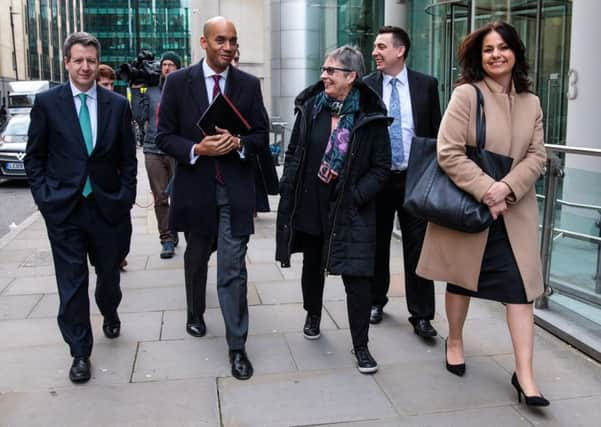Rise of ‘identity politics’ threatens progress on diversity – Peter Smyth


As the UK has become more diverse, so have the backgrounds of its political representatives and ingrained forms of cultural and racial prejudice fallen away – albeit slowly – in the face of progressive equality movements on gender, race, sexuality and more.
A recent poll for the BBC found that while just 19 per cent of Britons were positive about the effects of immigration in 2011, that figure now sits at 48 per cent, while the proportions viewing it negatively has dropped from 64 per cent to just 26 per cent over the same timeframe.
Advertisement
Hide AdAdvertisement
Hide AdThe researchers struggled to pinpoint why this shift has happened, but the clear trend is that the UK has become more comfortable with change and therefore more open to diversity in all its forms.
Is politics keeping up? In some ways, yes. Of 11 new members of The Independent Group (TIG) at Westminster so far, more than half are women and their chief spokesperson is Chuka Umunna, whose Nigerian and Anglo-Irish ethnicity reflects something of the rich diversity of his South London constituency.
Compared to politics a generation ago, perhaps the only remarkable thing about the so-called ‘TIGs’ is that the depth of diversity in their membership is pretty unremarkable.
We are used to having women in the top jobs, whether Prime Minister, First Minister or on the front benches and similarly, the appointment of BAME politicians in some of the country’s most senior positions raises barely an eyebrow among an electorate that is generally more interested in what they do than the colour of their skin.
The pace of change is accelerating – albeit slowly – against a backdrop of public opinion that’s far more relaxed about diversity than previous generations and indeed far less relaxed about having their own opportunities limited by leaders who are too old, too white and too male to grasp the significance of shifting social trends.
Looking ahead though, it’s still a legitimate question to wonder whether progress on diversity in politics can be protected and accelerated, or whether it might stall or reverse.
After all the definition of chauvinism – a term most often used to characterise sexists – also includes excessive or aggressive support for a single outlook, cause or group. That could be one’s own sex, but it can just as easily be a personal political outlook or philosophy; a tendency to embrace the echo chamber of politics that virtue-signals one’s own beliefs and castigates those of others.
There’s nothing wrong with standing on principle but ideological dogma or purity can leave political movements blind to the discomfort of groups led to feel excluded or threatened as a result.
Advertisement
Hide AdAdvertisement
Hide AdLabour’s deputy leader Tom Watson has said that the resignation from the party of Luciana Berger, a young, heavily pregnant Jewish MP who felt bullied by alleged institutional anti-Semitism in Labour and left to join TIG was the “worst day of shame” in the party’s history. Yet there are still voices in and around the party asking what all the fuss is about.
At the same time, 85 per cent of British Jews polled last year for the Jewish Chronicle concluded Jeremy Corbyn was antisemitic. Some 40 per cent said they would “seriously consider” emigrating if he became Prime Minister.
So the fuss is that a stream of political activism on the left has become inured, sometimes by accident, in others by design, to the fact that the language it uses can be deeply offensive to the great majority of one vulnerable minority, to the extent that they are perceived in their own way to be just as threatening as that used by far-right racists.
All of which is just one strand of evidence that a new kind of chauvinist ‘ldentity politics’ is grafting itself into the DNA of our democracy: one that pays lip service to diversity but which is blind to the discomfort of others if they happen to disagree or have a different perspective on things.
This represents a dilemma for the promotion of diversity in all its forms at a political level: if only interested in pleasing those with whom they agree already, how do campaigners reach across social divides and avoid alienating those who don’t?
Of course this is in no way just Labour’s problem. The UK’s largest parties each have their diehards, from Conservative-supporting Brexiteers labelling centrists “traitors” or “enemies of the people”, to so-called ‘cybernats’ whose more aggressively shouty brand of online activism has periodically embarrassed the party leadership.
The question facing mainstream parties is how to encourage passionate supporters to advocate on behalf of the cause without giving chauvinist voices free reign and alienating moderate voters.
If politicians think they can win by doubling down on attempts to please their own on (say for example) Brexit, rather than the broad churches of old, whole swathes of the voting public will either shift to the opposite end of the political spectrum, or switch off altogether.
Advertisement
Hide AdAdvertisement
Hide AdIn the end, diversity in politics has to be about more than optics; it should be about creating movements that ask people what they want and then listen to the answers in all their complexity. Because diverse people have diverse opinions, a fact that politicians need to find more ways to understand and respect.
Peter Smyth is director of public affairs at Indigo